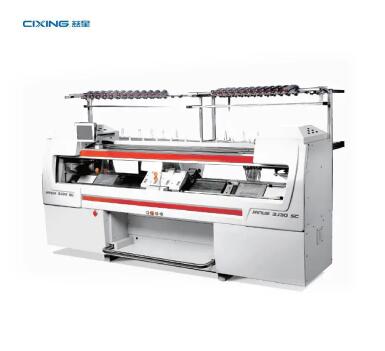The Future of Textile Machinery - Innovations Driving the Industry Forward
2024-08-24
The textile industry, a cornerstone of global manufacturing, is witnessing significant transformations driven by advancements in textile machinery. As demand for high-quality, sustainable, and efficient production methods increases, the development of innovative textile machines is paving the way for a new era in the industry. This article explores the latest trends, technological innovations, and the future outlook for textile machinery.

1. Rise of Smart Textile Machines:
One of the most notable trends in the textile industry is the integration of smart technology into textile machinery. Smart textile machines are equipped with sensors, data analytics, and IoT (Internet of Things) capabilities that allow real-time monitoring and optimization of production processes. These machines can detect and respond to issues such as thread breakage, tension variations, and fabric defects, ensuring high-quality output with minimal downtime.
- Predictive Maintenance:
By leveraging data analytics, smart textile machines can predict when maintenance is needed, reducing the risk of unexpected breakdowns and costly repairs. This predictive maintenance capability extends the lifespan of the machines and enhances overall operational efficiency.
- Enhanced Production Control:
Smart textile machines provide manufacturers with detailed insights into production parameters, enabling precise control over speed, tension, and patterning. This level of control allows for consistent product quality and the ability to produce complex designs with ease.
2. Sustainable Textile Machinery:
Sustainability has become a critical focus for the textile industry, driven by environmental concerns and consumer demand for eco-friendly products. Textile machinery manufacturers are responding by developing machines that minimize waste, reduce energy consumption, and utilize sustainable materials.
- Waterless Dyeing Machines:
Traditional dyeing processes consume large amounts of water and generate significant wastewater. Waterless dyeing machines, which use air or supercritical CO2 instead of water, are emerging as a sustainable alternative. These machines drastically reduce water usage, lower energy consumption, and eliminate the need for harmful chemicals, making the dyeing process more environmentally friendly.
- Recycling and Circular Economy:
Textile machinery is also evolving to support recycling and the circular economy. Machines that can efficiently process recycled fibers and fabrics are becoming increasingly important. Innovations in shredding, sorting, and spinning technologies enable the production of high-quality textiles from recycled materials, reducing the industry's reliance on virgin resources.
3. Automation and Robotics in Textile Production:
Automation and robotics are transforming the textile industry by streamlining production processes and reducing labor costs. Automated textile machines can handle tasks such as cutting, sewing, and packaging with speed and precision, allowing manufacturers to scale up production while maintaining quality.
- Robotic Sewing Machines:
The development of robotic sewing machines capable of handling delicate and complex sewing tasks is revolutionizing garment manufacturing. These machines offer consistent stitching quality, reduce the need for manual labor, and enable the production of intricate designs that were previously difficult to achieve.
- Automated Fabric Inspection:
Automated fabric inspection systems use cameras and machine learning algorithms to identify defects in real-time, ensuring that only high-quality fabrics move forward in the production process. This technology reduces waste, improves product quality, and increases overall production efficiency.
4. Digital Textile Printing:
Digital textile printing is gaining traction as a versatile and sustainable alternative to traditional printing methods. This technology allows for the direct printing of designs onto fabric using digital files, eliminating the need for screens and reducing waste.
- Customization and On-Demand Printing:
Digital textile printing offers unparalleled flexibility, allowing manufacturers to produce customized designs and respond quickly to market trends. On-demand printing reduces the need for large inventories, minimizing waste and aligning with sustainable production practices.
- Advancements in Ink Technology:
Recent advancements in ink technology have led to the development of eco-friendly, water-based inks that produce vibrant colors with minimal environmental impact. These inks are suitable for a wide range of fabrics, including natural fibers, synthetics, and blends.
Future Outlook:
The future of textile machinery is marked by continued innovation and a focus on sustainability, efficiency, and digitalization. As the industry embraces smart technologies, automation, and sustainable practices, textile manufacturers will be better equipped to meet the demands of a dynamic market and contribute to a more sustainable future.
Manufacturers and stakeholders in the textile industry are encouraged to invest in the latest textile machinery innovations to stay competitive, reduce environmental impact, and drive growth in the ever-evolving textile market. With these advancements, the textile industry is poised to enter a new era of production, defined by quality, sustainability, and technological excellence.


